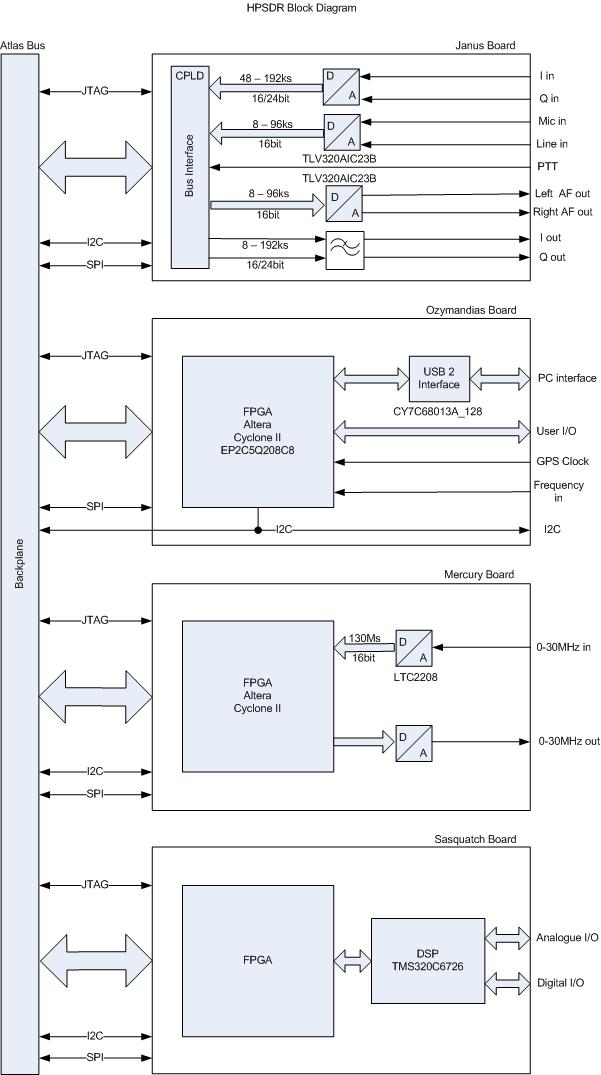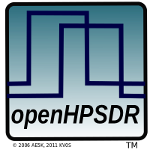Project History
Introduction -- What's It All About?
The HPSDR is an open source (GNU type) hardware and software project intended as a "next generation" Software Defined Radio (SDR) for use by Radio Amateurs ("hams") and Short Wave Listeners (SWLs). It is being designed and developed by a group of SDR enthusiasts with representation from interested experimenters worldwide. The discussion list membership currently stands at around 750 and includes such SDR enthusiasts as Ray Anderson WB6TPU, Steve Bible N7HPR, Phil Covington N8VB, Rick Hambly W2GPS, Phil Harman VK6APH, Lyle Johnson KK7P, Ulrich Rohde N1UL, and Bill Tracey KD5TFD to name a few.
The rationale behind the project is to break the overall design up into a number of modules. Each module is designed by an individual or group and connects to other modules using a pre-defined and common bus -- rather like plugging boards into a PC motherboard.
This modular approach enables prospective users to incorporate just the modules that interest them as well as designing their own variants if desired. The approach also enables new ideas and circuits to be tested by replacing an existing module. Since the majority of modules will be retained, such experimentation can be done with minimum disruption to an existing working system.
The modules vary in complexity from simple bandpass filters and input/output interfaces, to full blown DSP functions. Such variety enables experimenters with varying degrees of experience to contribute.
Thus far, the modules have each been named for easier identification when talking or writing about them. On this website, each module has its own web page, as noted by the tab selections near the top of the page. Some of the modules are being designed so that they can be either used in conjunction with others or stand-alone. Each module board size (except the backplane) will be 100 mm. by 120 to 220 mm. and use either a 96 pin or 64 pin DIN41612 type connector.
Milestone
- Atlas - June, 2006
- Backplane board to allow the easy connection between boards. Project leader Phil, N8VB.
- Pinocchio - 2006
- Extenter card allowing measurement and trobleshooting for an active card plugged into the atlas backplane. Project Leader Lyle, KK7P
- Janus - 2006
- Sound card type interface for the the SDR1000. It does not function as a computer soundcard. Bill, KD5TFD and Phil, VK6APH
- Ozy - 2006
- USB computer interface card to the atlas backplane. Phil, N8VB
- Penelope - October, 2008
- 1/2W transmitter/exciter board. Project leader Phil, VK6APH
- Mercury - October, 2008
- Direct sampling of the 0-65 MHz spectrum receiver board. Project leader Phil, VK6APH
- LPU - April, 2009
- Linear Power Unit. Project leader Scotty, WA2DFI
- Pandora - May, 2009
- The Box. Project leader John, N8UR
- PennyWhistle - October, 2009
- 20W Power Amplifier. Project leader Graham KE9H
- Excalibur - October, 2009
- Board to allow the injection of an external 10 mHz signal. Project leader Graham KE9H
- Magister - September, 2010 1/2W transmitter/exciter board. Project leader Lyle, KK7P
- Metis - December, 2010
- 100/1000 gbit Ethernet interface board. Project leader Phil, VK6APH
- Alex -i December 2012
- Filter set for use with Atlas set or Hermes.
- Hermes - March 2012
- Single board version of openHPSDR.
Early Block Diagram

Some Glossary Definitions
Since this website and project is attracting interested persons who are not Radio Amateurs and hams who may not be familiar with some of the technical jargon, here are a few words about what some of the mysterious acronyms, etc. may stand for.
Radio Amateurs ("hams") -- persons around the world interested in radio communications and do so without monetary compensation (hence as in sports, the term "amateur" as opposed to "professional" in the sense of not receiving money for what they do). For more information on this hobby/service, start with www.hello-radio.org. In many cases on this website, we'll use the assigned "call letters" of the ham -- in most cases, more information can be found about this person by going to a search website such as http://qrz.com.
SDR - Software Defined Radio --
DSP - Digital Signal Processing --
FPGA - Field Programmable Gate Array --
Open source design
Brief definition of Open Source
In a "nutshell", open source is a term that is applied to a philosophy, in that the production and organization of a project or system is created through open and cooperative efforts.
Open source software refers to computer software available with its source code and under an "open source license" to study, change and improve its design and functionality.
There are many "Open source software" licenses, the most prominent being the GNU General Public License (GNU GPL or simply GPL), originally written by Richard Stallman. The GPL grants the recipients of a computer program the following rights, or freedoms:
* The freedom to run the program, for any purpose.
* The freedom to study how the program works, and modify it.
* The freedom to redistribute copies.
* The freedom to improve the program, and release the improvements to the public.
The users are treated like co-developers, are encouraged to submit additions to the software, code fixes, bug reports, documentation etc. Having more co-developers increases the rate at which the software evolves. Furthermore, each end user's machine provides an additional testing environment. This new testing environment offers the ability to find and fix a new bug quickly.
[Note: this definition does not go into the various obligations and legalities and is intended to be brief and non-exhaustive. The original was supplied by Kevin, M0KHZ with a few words "Americanized" by the webmaster.]
Open Hardware License - Non-Commercial License
This GPL philosophy extends to the hardware for this HPSDR cooperative project. However it was felt by many that the software GPL and similar licenses would not adequately cover the hardware portion of this project, so an Open Hardware License (OHL) was devised. Also, another license referred to as the NCL - Non-Commercial License, was implemented to take care of situation where the project developers wish to reserve commercial licensing rights. The complete text of the two versions of the OHL/NCL licenses along with some explanation may be found on the TAPR website at http://www.tapr.org/ohl.html
Further Information
There are several sources of further information about this project and the various modules. On the "cutting edge" of information we have a discussion list. There's more information about the list/reflector if you click the menu bar in the upper left area of this web page where it says "Discussion List". Message traffic on the list varies from 0 to 20 or more in a day.
For those who just wish to be informed about important announcements or events in the HPSDR project, we have an "announce only" list with very low traffic. More information about this announcement list may be found at the same "Discussion List" menu bar.
How does one become a participant? Jump right in! Subscribe to the discussion list. Make suggestions, ask questions, offer ideas for new modules, volunteer to help with design, research alternatives, PCB layout, documentation, firmware and software ...
The tabs at the top edge of this web page will lead you to individual module web pages. We also now have a "wiki" at Community_Portal to which the project leaders have direct edit access and is more current than the module web pages on this website. You'll most likely find the latest information on the design and progress in the wiki.
Contacting Us
The best method of contacting any of the developers is to join the discussion list (you must subscribe in order to post a message) and "talk" to them directly there.
For web page inquiries, reporting broken links or incorrect information, wiki, discussion list subscriptions, etc., please email the discussion list administrator and web/wiki-master directly at "KV0S" at "openhpsdr" dot "org".
